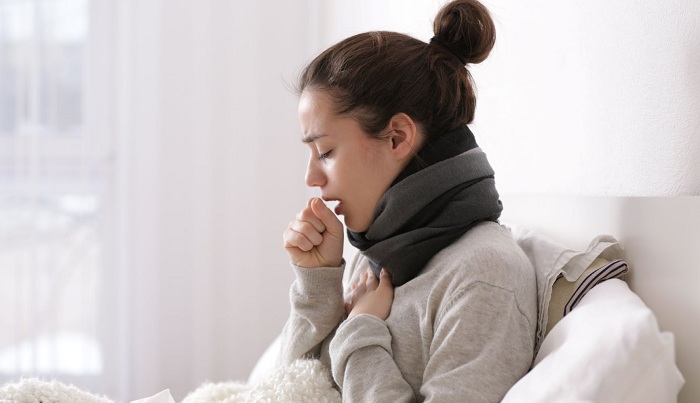One of the most common respiratory conditions a person develops is bronchitis. This happens when the lining of the lungs’ bronchial tubes has become swollen or inflamed. There are two types of bronchitis: acute or chronic. In most cases acute bronchitis eventually clears up without requiring treatment. As for chronic bronchitis, this is more severe and harder to manage.
Some symptoms of bronchitis can be annoying during the day, such as coughing, wheezing, a sore throat, chest tenderness while coughing, and fatigue. These can also prevent you from getting a good night’s sleep.
If you’re suffering from bronchitis, let’s take a look at the ways you can get a good night’s sleep despite your condition:
Stick To A Nutritious Diet
One way to help you get enough sleep is by maintaining a nutritious diet. The ideal diet should include vegetables, fruits, whole grains, poultry, lean meats, beans, fish, nuts, and eggs. Don’t forget to include low-fat dairy and fat-free products while limiting food items that contain saturated and trans-fat, salt, cholesterol, and added sugars.
The role of a healthy diet is to boost your immune system, which can aid the body in having a better chance to overcome bronchitis in no time.
Elevate Your Head
The coughing caused by bronchitis can disrupt your sleep at night. Sleeping flat on your side or back causes mucus to build up in your throat, which triggers a cough. The ideal way to prevent this is to raise the level of your head by using more pillows. Another option is to utilize a wedge that will raise both your head and neck. Just remember to avoid elevating excessively since this could result in neck pains.
Use A BiPAP Machine
Similar to other lung diseases, bronchitis causes breathing difficulties, particularly wheezing. A device that can ease breathing issues is a bi-level positive airway pressure (BiPAP) machine. It helps a person with bronchitis breathe with the delivery of pressurized air via a face mask. This device works by supplying varying air pressure levels during inhalation and exhalation, helping soothe the lungs and muscles of the chest wall.
A BiPAP machine is typically recommended for nighttime use since breathing is significantly impaired during this time, and it will allow the person to sleep peacefully. You can use the machine at home or in a hospital setting.
When using a BiPAP machine, position the mask over your nose or mouth. Make sure that the edges of the mask fit your face securely. The machine will deliver one pressure level while you inhale, and a lower pressure as you exhale.
Use Steam
Before heading to bed, go for a warm shower or bath. You can even consider steaming your face over a bowl or basin that contains warm water for 10 to 15 minutes. The steam produced by the warm water can help loosen up the mucus in your sinuses and chest. This can help clear your airways, lessening the symptoms of bronchitis as you sleep. With the help of steam, you have a higher chance of experiencing a good night’s rest.
Increase Your Intake Of Fluids
Since bronchitis is a lower respiratory tract infection, a person with this condition must drink more fluids, as this can help with the following:
- Loosening up and reducing the thickness of mucus
- Moistening the throat
- Lowering the risk for dehydration
Aside from water, you should consume soup, juice, and herbal tea. A cup of hot tea will also work wonders, providing the same effect as steam. Go for an herbal tea blend without caffeine. Variants that contain eucalyptus, chamomile, and other soothing herbs that can often be found in sleep apnea supplements are good choices that can help you sleep well at night.
Use A Humidifier
A humidifier increases the level of moisture in a room by releasing steam or water vapor. When humidity is low, it’s likely to irritate the throat and nasal passages, thus aggravating the symptoms of bronchitis.
A humidifier releases heated and humidified air to loosen and promote better mucus drainage. When using a humidifier, make sure that it’s well-maintained. Moreover, always monitor the humidity levels. Once the device is not maintained or regularly cleaned, it becomes a breeding ground for bacteria or mold as the leftover water gets contaminated and solidifies over time.
Soothe Your Sore Throat
If you can’t sleep well due to a sore throat caused by bronchitis, there are various ways you can soothe this condition. Let’s take a look at ways to soothe a sore throat so you can get a good night’s rest:
- Gargle saltwater
- Drink warm or cool fluids
- Take an over-the-counter pain medication
- Use over-the-counter lozenges and sprays
Get Rid Of Irritants
If you want to lessen the symptoms of bronchitis during nighttime, it’s vital to eliminate all potential irritants in your bedroom. In case you have pets, don’t allow them inside your bedroom since animal dander can aggravate these symptoms as well.
It’s also vital to avoid exposure to other irritants that can trigger bronchitis symptoms, such as air pollution, dust, and chemicals in household products. Additionally, avoid using any scented candles, perfumes, cleaning agents, or products that can irritate the respiratory system. Also make sure to regularly change the filters in the heating and air conditioning systems at home.
Take Pain Medications
Before using any pain medication, it’s best to first consult your doctor about your symptoms, especially if they disrupt your sleep at night. Some over-the-counter pain medications that can lessen your discomfort include ibuprofen (Motrin, Advil), aspirin, or naproxen (Aleve). Talk to your doctor about which pain medication is suited to you and your condition.
Quit Smoking
Similar to chronic obstructive pulmonary disease or COPD, one of the main causes of chronic bronchitis is smoking. If you want to sleep peacefully at night, your best course of action would be to stop smoking and avoid exposure to secondhand smoke. This move can make a big difference in the overall quality of your life.
Smoking impairs the bronchial tubes and lowers the body’s defense system against potential infection. Exposure to smoke can stimulate coughing episodes if a person has bronchitis.
Quitting cold turkey or limiting the habit reduces potential damage to the bronchial tubes and promotes faster healing. A person who quits smoking early is less likely to end up with acute bronchitis in the future.
 sleep pictures by Depositphotos
sleep pictures by Depositphotos
Final Thoughts
If you’ve been diagnosed with bronchitis, getting enough sleep at night is vital to promote your recovery. Since the symptoms can be quite troublesome, especially if they disrupt your sleep, you can try out the tips above to reduce the symptoms so you can get have a restful night.



















